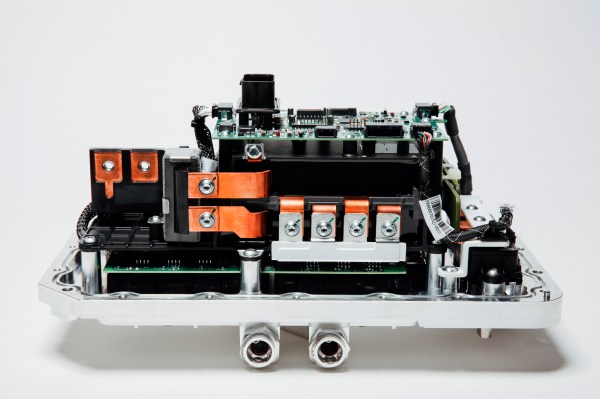Faraday Future has its first U.S. patent in hand for a smaller, more powerful inverter. So it’s definitely not as sexy as the Batmobile-like concept car the company brought to its splashy debut at CES 2016, but it is arguably more useful.
For one thing, this is a real-world piece of equipment that will be a core component of Faraday Future’s first vehicle—and next vehicle, and next vehicle, and the vehicle after that. FF is betting on its Variable Platform Architecture to underpin all the vehicles it creates, from compact cars to pickup trucks. “We need to have technology to back that up,” says FF spokesperson Ezekiel Wheeler.
An inverter, as Silva Hiti, the senior director of electric drive at FF, explains, “transforms the energy from the batteries to a form consumable by the motor.” So the DC power stored in the batteries flows into the inverter and then flows out to the motor as AC power.
The FF Echelon Inverter, as the new device is known, is more reliable and easier to manufacture than “off-the-shelf” inverters for electric vehicles, with a higher-power density. The solution to many of these problems was to build a simpler system with fewer parts. That translates to fewer parts that can fail and fewer materials to be used. “We want it to be as light as possible and as small as possible to address reliability issues,” Hiti says.
Smaller and simpler also translates to better efficiency. “You want to maximize the inverter’s efficiency to get the most range from the batteries,” says Steven Schulz, a tech fellow at FF. “If you have, say, 100 watts going in, you want as close as possible to 100 watts to come out.”
Wheeler notes that this is the first patent of about 100 the company has filed in its year of existence. Since FF plans on keeping its first vehicle under wraps until it’s nearly ready for release to the public, we can probably expect to see more of these patents and components before we ever see a prototype or concept car that’s anything like what we’ll be able to buy — possibly in 2017. “We’ll have plenty more news coming out down the line,” says Wheeler. “This is just the start.”
